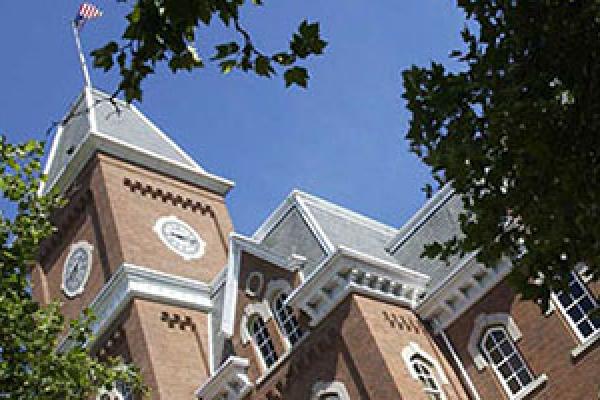Eleven Pilot Projects to Support Humanities and Arts Discovery Theme

The Division of Arts and Humanities has been awarded a $1.1 million grant, from the university’s Humanities and the Arts Discovery Theme, to a select group of 11 pilot projects to begin in the 2016-2017 academic year. Led by cross-disciplinary groups of faculty, these two-year projects are focused on understanding, representing and addressing specific social issues and contemporary problems while also creating a diverse, engaged research and learning community.
“One of the goals of the Discovery Theme is to build intellectual community among faculty within and beyond the Arts and Sciences, and these incredibly collaborative projects strongly illustrate that point,” said Peter Hahn, divisional dean of arts and humanities. “In all, there are more than more than 20 departments and centers and 50 faculty members involved in this endeavor. I appreciate their readiness to work together and with other university colleagues, and I admire their ambition in taking on projects aimed at understanding and solving real-world challenges.”
Here is a brief description of each pilot project. More details and a list of faculty collaborators on each project may be found on the Arts and Humanities Discovery Theme website.
Be the Street: A Performance Studies Project on Human Mobility and Placemaking brings faculty and graduate students across five fields (theatre, dance, Spanish and Portuguese, comparative studies and city planning) who work in the interdisciplinary area of Performance Studies together with Columbus community groups to create a series of ethnographically informed theatre or dance productions exploring migration and community transformation.
Collaboration for Humane Technologies will foster arts-driven, interdisciplinary research to take action on challenges that impact life and livability in the 21st century. At the core of the project are two Pop-Up Collaborations as well as innovative public events, documentation and dissemination. The first Pop-Up will focus on humane technologies, exploring new ways to interact with dynamic mediums that access our multisensory human capacities.
Contemporary Art and Its Publics: Working Through Reproduction will support programming over the next two years related to the broad theme of contemporary art and its public accessibility, with a special focus on the crucial role of curators and exhibitions. It will engage with the issues of artistic appropriation and mechanical reproducibility and how these issues have altered our relation to and understanding of art.
The Emergence of Number seeks to build a world-leading multidisciplinary community within Ohio State with the capacity to stimulate, produce and disseminate outstanding research on the cultural, historical and cognitive underpinnings of human numerical capacities. The project will focus on interface issues at the intersection of such disciplines as history, linguistics, logic, mathematics, neuroscience, philosophy and psychology.
Environmental Humanities aims to build infrastructure that will facilitate innovative research, teaching and outreach in this interdisciplinary field. The topical focus of the pilot grant is climate change, with guest lectures, exhibitions, film screenings and special course offerings. The goal of the pilot project is to lay the groundwork for making Ohio State a regional and national leader in Environmental Humanities.
From Homer to the Qur’an: The Ancient World at OSU expresses the chronological and geographical breadth and inter-departmental scope of this project, which will capitalize on the university’s remarkable strength in ancient studies and build a program of worldwide recognition that benefits not only scholarship and teaching but also broader public understanding of the ancient past and its continuing influence.
Human Rights in Transit will create a dynamic knowledge hub to grapple with the complex and multidisciplinary questions raised by the fact that human rights, the human and human environments are in transit. The knowledge hub, a metaphorical location as well as a method of transmission driven by collaboration, research, teaching and community relationships, will show that knowledge — as well as human rights — is “in transit.”
Migrants and Movers: Humanities and Arts Perspectives on Global Mobility addresses the study of migration to investigate how local cultural factors and decision-making inform global dynamics. The project will integrate the insights of the humanities and arts with the social sciences to facilitate a conversation on how to advance the study of global mobility.
Project Narrative: Applied Narrative Theory will enhance efforts to apply the distinct knowledge and skills of the arts and humanities, especially the knowledge and skills associated with stories and storytelling, in three areas that overlap: narrative medicine, comics studies and collaborative storytelling. The project builds on the Project Narrative program begun in 2006, which has become the world center for the study of stories and storytelling.
Proposal for Programming Leading to a Science and Technology Studies Center will bring together scholars, scientists and engineers from across the university to discuss ideas and create projects that illuminate issues associated with the responsible development and use of science and technology in globally diverse societies and conditions. The project will focus on four themes: cultural studies of science and technology; under-representation in STEM; ethical and legal issues arising from advancements in science and technology; and art and technology.
Transnational Black Citizenship After Civil Rights and Decolonization Movements will engage faculty throughout the university in developing a humanities-based “think tank” that, through pedagogy and research, will make Ohio State a destination for faculty, postdocs and students who are invested in critical studies of transnational black citizenship. This project will analyze the question, "what is blackness?" — which is less about the study of black people than about defining, studying and teaching about blackness in the 21st century.
